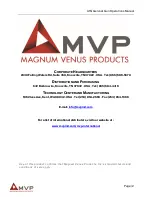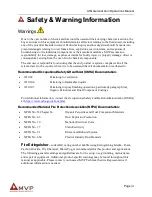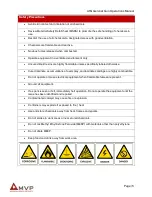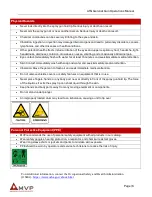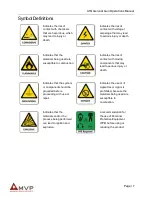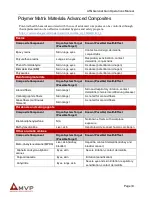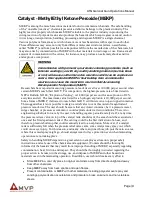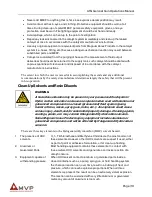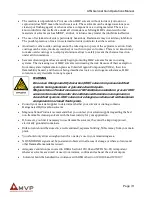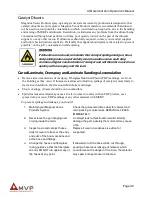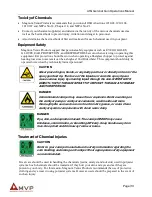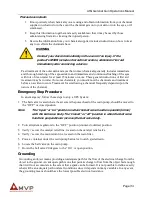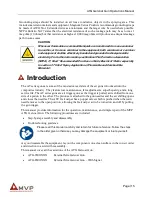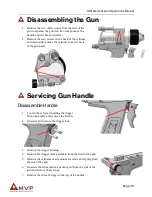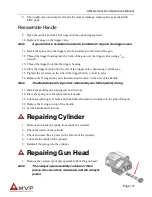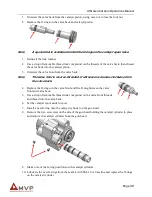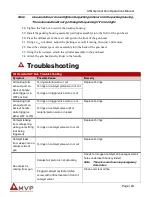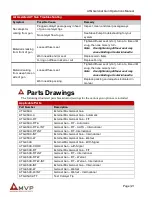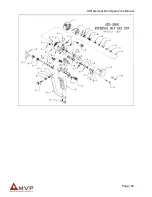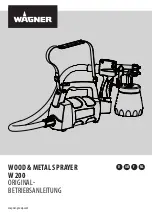
ATG Gelcoat Gun Operations Manual
Page | 10
Never add MEKP to anything that is hot, since explosive decomposition may result.
Avoid contact with skin, eyes, and clothing. Protective equipment should be worn at all
times. During clean-up of spilled MEKP, personal safety equipment, gloves, and eye
protection must be worn. Firefighting equipment should be at hand and ready.
Avoid spillage, which can heat up to the point of self-ignition.
Repair any leaks discovered in the catalyst system immediately, and clean-up the leaked
catalyst at once in accordance with the catalyst manufacturer’s instructions.
Use only original equipment or equivalent parts from Magnum Venus Products in the catalyst
system (i.e.: hoses, fitting, etc.) because a dangerous chemical reaction may result between
substituted parts and MEKP.
Catalyst accumulated from the purging of hoses or the measurement of fluid output
deliveries should never be returned to the supply tank, such catalyst should be diluted with
copious quantities of clean water and disposed of in accordance with the catalyst
manufacturer’s instructions.
The extent to which the user is successful in accomplishing these ends and any additional
recommendations by the catalyst manufacturer determines largely the safety that will be present
in his operation.
Clean-Up Solvents and Resin Diluents
WARNING
A hazardous situation may be present in your pressurized fluid system!
Hydro carbon solvents can cause an explosion when used with aluminum or
galvanized components in a closed (pressurized) fluid system (pump,
heaters, filters, valves, spray guns, tanks, etc.). An explosion could cause
serious injury, death, and/or substantial property damage. Cleaning agents,
coatings, paints, etc. may contain Halogenated Hyrdrocarbon solvents.
Some Magnum Venus Products spray equipment includes aluminum or
galvanized components and will be affected by Halogenated Hydrocarbon
solvents.
There are three key elements to the Halogenated Hyrdocarbon (HHC) solvent hazard.
1.
The presence of HHC
solvents.
1,1,1 – Trichloroethane and Methylene Chloride are the most common of
these solvents. However, other HHC solvents are suspect if used; either
as part of paint or adhesives formulation, or for clean-up flushing.
2. Aluminum or
Galvanized Parts.
Most handling equipment contains these elements. In contact with
these metals, HHC solvents could generate a corrosive reaction of a
catalytic nature.
3. Equipment capable of
withstanding pressure.
When HHC solvent contact aluminum or galvanized parts inside a
closed container such as a pump, spray gun, or fluid handling system,
the chemical reaction can, over time, result in a build-up of heat and
pressure, which can reach explosive proportions. When all three
elements are present, the result can be an extremely violent explosion.
The reaction can be sustained with very little aluminum or galvanized
metal; any amount of aluminum is too much.
Summary of Contents for ATG Series
Page 22: ...ATG Gelcoat Gun Operations Manual Page 22 ...
Page 23: ...ATG Gelcoat Gun Operations Manual Page 23 ...
Page 24: ...ATG Gelcoat Gun Operations Manual Page 24 ...
Page 25: ...ATG Gelcoat Gun Operations Manual Page 25 ...
Page 26: ...ATG Gelcoat Gun Operations Manual Page 26 ...
Page 27: ...ATG Gelcoat Gun Operations Manual Page 27 ...
Page 28: ...ATG Gelcoat Gun Operations Manual Page 28 ...
Page 29: ...ATG Gelcoat Gun Operations Manual Page 29 ...
Page 30: ...ATG Gelcoat Gun Operations Manual Page 30 ...
Page 31: ...ATG Gelcoat Gun Operations Manual Page 31 ...
Page 32: ...ATG Gelcoat Gun Operations Manual Page 32 ...
Page 33: ...ATG Gelcoat Gun Operations Manual Page 33 ...
Page 34: ...ATG Gelcoat Gun Operations Manual Page 34 ...
Page 35: ...ATG Gelcoat Gun Operations Manual Page 35 ...
Page 36: ...ATG Gelcoat Gun Operations Manual Page 36 ...
Page 37: ...ATG Gelcoat Gun Operations Manual Page 37 ...
Page 38: ...ATG Gelcoat Gun Operations Manual Page 38 ...
Page 39: ...ATG Gelcoat Gun Operations Manual Page 39 ...
Page 40: ...ATG Gelcoat Gun Operations Manual Page 40 ...
Page 41: ...ATG Gelcoat Gun Operations Manual Page 41 ...
Page 42: ...ATG Gelcoat Gun Operations Manual Page 42 ...
Page 43: ...ATG Gelcoat Gun Operations Manual Page 43 ...
Page 44: ...ATG Gelcoat Gun Operations Manual Page 44 ...
Page 45: ...ATG Gelcoat Gun Operations Manual Page 45 ...
Page 46: ...ATG Gelcoat Gun Operations Manual Page 46 ...
Page 47: ...ATG Gelcoat Gun Operations Manual Page 47 ...
Page 48: ...ATG Gelcoat Gun Operations Manual Page 48 ...
Page 49: ...ATG Gelcoat Gun Operations Manual Page 49 ...
Page 50: ...ATG Gelcoat Gun Operations Manual Page 50 ...
Page 51: ...ATG Gelcoat Gun Operations Manual Page 51 ...
Page 52: ...ATG Gelcoat Gun Operations Manual Page 52 ...
Page 53: ...ATG Gelcoat Gun Operations Manual Page 53 ...
Page 54: ...ATG Gelcoat Gun Operations Manual Page 54 ...
Page 55: ...ATG Gelcoat Gun Operations Manual Page 55 ...
Page 56: ...ATG Gelcoat Gun Operations Manual Page 56 ...
Page 57: ...ATG Gelcoat Gun Operations Manual Page 57 ...
Page 58: ...ATG Gelcoat Gun Operations Manual Page 58 ...
Page 59: ...ATG Gelcoat Gun Operations Manual Page 59 ...
Page 60: ...ATG Gelcoat Gun Operations Manual Page 60 ...
Page 61: ...ATG Gelcoat Gun Operations Manual Page 61 ...
Page 62: ...ATG Gelcoat Gun Operations Manual Page 62 ...
Page 63: ...ATG Gelcoat Gun Operations Manual Page 63 ...
Page 64: ...ATG Gelcoat Gun Operations Manual Page 64 ...
Page 65: ...ATG Gelcoat Gun Operations Manual Page 65 ...
Page 66: ...ATG Gelcoat Gun Operations Manual Page 66 ...
Page 67: ...ATG Gelcoat Gun Operations Manual Page 67 ...
Page 68: ...ATG Gelcoat Gun Operations Manual Page 68 ...
Page 69: ...ATG Gelcoat Gun Operations Manual Page 69 ...
Page 70: ...ATG Gelcoat Gun Operations Manual Page 70 ...
Page 71: ...ATG Gelcoat Gun Operations Manual Page 71 ...


